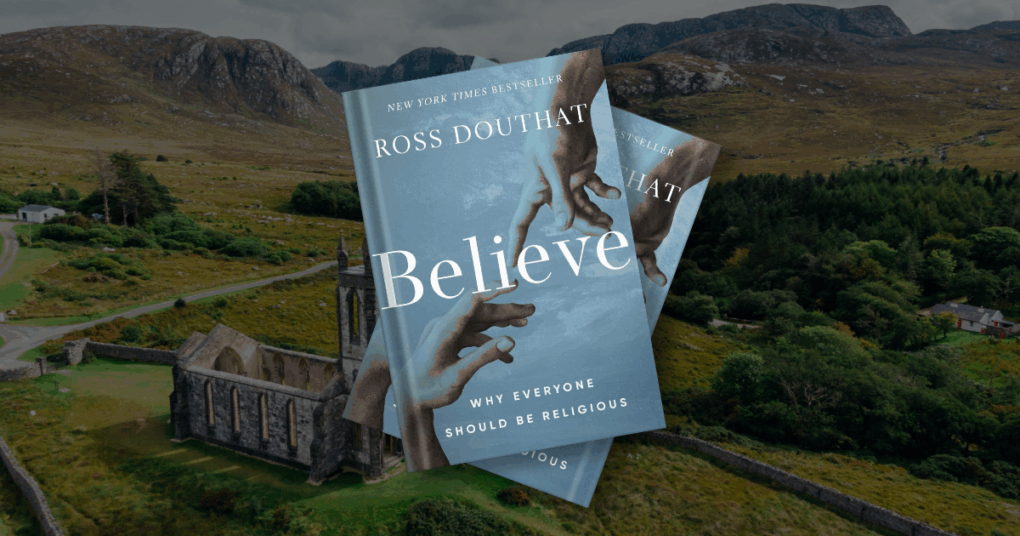Believe: Why Everyone Should Be Religious
Ross Douthat
Convergent Books
September 2024
240 pages
ISBN: 978-0310367581
Believe: Why Everyone Should Be Religious is the new book by New York Times columnist Ross Douthat. Working in America’s premier left-wing media outlet, Douthat often explains trends in American Christianity to a secular readership, a role he tackles with considerable skill as one of the most articulate and thoughtful writers around. He notes a shift in recent years compared to his early days as a columnist from 2009 onward. During the peak of “New Atheism,” hostile feedback typically came from readers who had rejected their parents’ beliefs with determination. More recently, his readers are increasingly unfamiliar with religion, having not been raised in one, yet they are more open to spiritual exploration. This religious vibe shift, evident in the West through conversions like those of former atheist Ayaan Hirsi Ali, her husband Niall Ferguson, or the writings of historian Tom Holland (author of Dominion: The Making of the Western Mind), underscores Douthat’s observation: “The spiritual and supernatural never really go away, and already the time of the New Atheism is passing. Already mystery, magic, and enchantment seem to be rushing back into the world.” He argues that the growing desire to understand life’s mysteries makes it vital for believers to engage with those seeking answers, as his “unhappily agnostic correspondents are on the hunt for gnosis: the divine experience, the hidden architecture, the secret truth.”
Douthat’s book is neither a social science study on the benefits of religious practice – such as improved physical or mental health or community involvement – nor a work of Christian apologetics. Instead, he structures it to appeal to readers drawn to various religions, including non-Christian ones, saving an explicitly Christian chapter for the end. He begins by examining scientific developments over recent centuries that have led some to question the existence of a Creator. Far from undermining faith, Douthat views discoveries like the mathematical order of the solar system as evidence of a purposeful divine design. He argues that Darwin’s theory of evolution leaves key questions about life’s origins unanswered and that the limited understanding of the human mind’s complexities should humble those who claim all mysteries are solved. On this, he notes that Artificial Intelligence architects still lack any idea of how to create a conscious self, producing machines that merely simulate the output of the human mind. As he puts it, “[T]he habit of thinking that regards scientific progress as perpetually diminishing the reasonability of religion has things backward. The idea that the cosmos was intended, that mind is more fundamental than matter, that our minds in particular have a special relationship to the physical world and its originating cause, all of these ideas have had their plausibility strengthened, not weakened, by centuries of scientific success.”
The rise of individualistic spirituality fascinates Douthat. Despite secularism’s gains in America and beyond, belief – or at least curiosity – about the scientifically inexplicable persists. For instance, about one in three Americans claims to have witnessed a miraculous healing, and evidence of spiritual or supernatural interactions is growing. Near-death experiences are increasingly documented, with scientific analyses, including vivid accounts of heavenly encounters, steadily accumulating. Within his own Church, Douthat points to the unprecedented number of canonisations in recent decades, noting that despite medical advances, miracles lacking satisfactory explanations remain abundant. Globally, he proposes a compelling thesis dividing religious outlooks into three types: ethical, mystical, or liturgical. He also tackles major objections to belief persuasively. To the question of why God permits evil, he cites personal suffering, like his well-documented struggle with chronic Lyme disease, as a path to closeness with God. Addressing the evils committed by religious institutions, he reminds readers that all institutions, secular and religious, have done both good and ill. On the charge that religions obsess over sex, Douthat counters: would not a God who created humanity and cares deeply for His creation have an interest in that aspect of life as well?
Douthat emphasises the value of shared religious participation over the hyper-individualistic practices prevalent in the post-Christian West, arguing that those grappling with big questions should not do so alone. He warns, “[T]he idea that you are better off putting together a religious worldview entirely on your own… presumes a lot on the strength of your individual intellect and moral compass, to say nothing of more supernatural questions,” urging people to turn to major traditions. However, his broad approach becomes a weakness. His claim that “the better trodden a religious pathway, the more wisdom there is in following after the generations that have trodden it before” seems naive. A religion’s size or longevity does not guarantee the truth of its teachings or the virtue of its leaders. Early Islam outpaced Christianity’s growth through military conquest, and the Aztec religion dominated Mesoamerica due to superior military might – hardly reasons to endorse their gods. Billions have followed Hinduism, yet its historical practices like the caste system or widow burning remain indefensible. Defending religion broadly invites absurdities. A sharper focus on Christianity would have strengthened the book, but Believe remains a concise and compelling case for the reasonableness of faith in an era where the strident voices of New Atheism are fading.
About the Author: James Bradshaw
James Bradshaw writes on topics including history, culture, film and literature.

